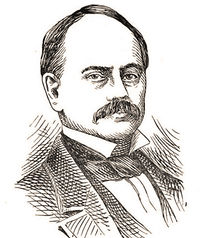Annotation:Jordan is a Hard Road to Travel: Difference between revisions
No edit summary |
No edit summary |
||
| Line 2: | Line 2: | ||
---- | ---- | ||
<p><font face="garamond, serif" size="4"> | <p><font face="garamond, serif" size="4"> | ||
'''JORDAN IS (AM) A HARD ROAD TO TRAVEL'''. AKA and see "[[T'Other Side of Jordan]]," "[[Other Side of Jordan]]." Old-Time, Breakdown; American, March and Polka. USA, Va. G Major (Christeson, Ford, Silberberg): C Major (Miller & Perron). Standard tuning (fiddle). AB (Silberberg): AABB (Christeson, Ford, Miller & Perron). The title is from the words of minstrel Dan Emmett's (Ohio) song. Bayard (1981) prints two tunes ("It Thundered In the East" and an untitled hornpipe; Nos. 88 & 89, p. 54) that strongly resemble this song. He thinks they all may have been descended from some older traditional tune. The parts are reversed from each other in Ira Ford's ('''Traditional Music in America''') and A.F. Hopkins ('''American Veteran Fifer''') versions. Its inclusion in '''American Veteran Fifer''' (as it was used as a march) is somewhat ironic as composer Dan Emmett was also a fifer, and co-wrote one of the core Civil War musicians' tutors ('''Bruce & Emmett's Tutor'''). Emmett composed this piece for the minstrel stage, but did not include it as one of his marches in his own fife tutor. See also "[[Jawbone]]" in Krassen, 1973. | '''JORDAN IS (AM) A HARD ROAD TO TRAVEL'''. AKA and see "[[T'Other Side of Jordan]]," "[[Other Side of Jordan]]." Old-Time, Breakdown; American, March and Polka. USA, Va. G Major (Christeson, Ford, Silberberg): C Major (Miller & Perron). Standard tuning (fiddle). AB (Silberberg): AABB (Christeson, Ford, Miller & Perron). The title is from the words of minstrel Dan Emmett's (Ohio) song. Bayard (1981) prints two tunes ("It Thundered In the East" and an untitled hornpipe; Nos. 88 & 89, p. 54) that strongly resemble this song. He thinks they all may have been descended from some older traditional tune. The parts are reversed from each other in Ira Ford's ('''Traditional Music in America''') and A.F. Hopkins ('''American Veteran Fifer''') versions. Its inclusion in '''American Veteran Fifer''' (as it was used as a march) is somewhat ironic as composer Dan Emmett was also a fifer, and co-wrote one of the core Civil War musicians' tutors ('''Bruce & Emmett's Tutor'''). Emmett composed this piece for the minstrel stage, but did not include it as one of his marches in his own fife tutor. See also "[[Jawbone]]" in Krassen, 1973. | ||
[[File:emmett.jpg|200px|thumb|left|Dan Emmett]] | |||
<br> | <br> | ||
<br> | <br> | ||
Revision as of 20:48, 31 January 2015
Back to Jordan is a Hard Road to Travel
JORDAN IS (AM) A HARD ROAD TO TRAVEL. AKA and see "T'Other Side of Jordan," "Other Side of Jordan." Old-Time, Breakdown; American, March and Polka. USA, Va. G Major (Christeson, Ford, Silberberg): C Major (Miller & Perron). Standard tuning (fiddle). AB (Silberberg): AABB (Christeson, Ford, Miller & Perron). The title is from the words of minstrel Dan Emmett's (Ohio) song. Bayard (1981) prints two tunes ("It Thundered In the East" and an untitled hornpipe; Nos. 88 & 89, p. 54) that strongly resemble this song. He thinks they all may have been descended from some older traditional tune. The parts are reversed from each other in Ira Ford's (Traditional Music in America) and A.F. Hopkins (American Veteran Fifer) versions. Its inclusion in American Veteran Fifer (as it was used as a march) is somewhat ironic as composer Dan Emmett was also a fifer, and co-wrote one of the core Civil War musicians' tutors (Bruce & Emmett's Tutor). Emmett composed this piece for the minstrel stage, but did not include it as one of his marches in his own fife tutor. See also "Jawbone" in Krassen, 1973.

Sources for notated versions: Cy Kines (Fauquier County, Va.) [Christeson]; Greg Canote (Seattle) [Silberberg].
Printed sources: R.P. Christeson (Old Time Fiddlers Repertory, vol. 1), 1973; p. 90. Ford (Traditional Music in America), 1940; p. 82 (appears as "T'Other Side of Jordan"). Howe (Musician's Omnibus, No. 1), 1862; p. 47. Miller & Perron (101 Polkas), 1978; No. 61. Silberberg (Tunes I Learned at Tractor Tavern), 2002; p. 77.
Recorded sources:
